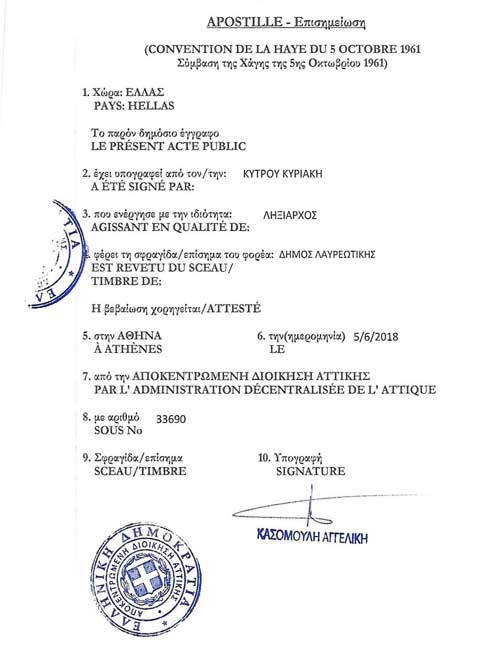Schmidt & Schmidt covers the full spectrum of legalization services for documents issued in Greece.
Greece joined the Hague Convention on the Simplified Authentication of Documents on 19 March 1985; the Convention entered into force on 18 May 1985.
The apostille, or the “Hague apostille” is a certificate that authenticates the origin of a public document (e.g., a birth, marriage or death certificate, a judgment, an extract of a register or a notarial attestation). It confirms the authenticity of the signature and the authority of an official who signed the public document.
Documents issued in Greece are certified with an apostille in accordance with the Hague Convention of 1961 are recognized in all Member States of the Hague Convention and do not require any other form of certification, such as consular legalization, which considerably reduces the costs and time required for the certification of documents. So far, more than 120 states have joined the Convention.
The apostille is not sufficient for use in the states that are not party to the Hague Convention. In this case, consular legalization applies to a public document.
For some countries, there are special regulations because Greece has objected to their accession to the Convention. Consular legalization of the documents is usually necessary for Kyrgyzstan, Mongolia, Uzbekistan, Peru, Tunisia, Philippines, Kosovo, Pakistan
Designated Competent Apostille Authorities in Greece
The application of the Apostille Convention depends on the participation of both the State of execution (where the public document was executed) and the State of Destination (where the document is to be presented) as State Parties to the Convention. In Greece, the designated competent authorities for apostille stamp are as follows:
- The Regional Self-Government Offices for all documents issued by their respective offices within the Regions.
- The Decentralized Administration for documents issued by public civil services of the Regions not falling under the jurisdiction of the Regional Self-Government, as well as Legal Entities of Public Law, First-degree Local Government Organizations, and the Registry Offices.
- For judicial documents, the First Instance Court of the region where the issuing authority is located serves as the competent authority.
The apostille in Greece is a square stamp in Greek with the obligatory heading "Apostille" and a reference to the 1961 Hague Convention in French (Convention de La Haye du 5 octobre 1961). The apostille certificate’s sides will be at least 9 centimeters long.
Types of documents

| Can be apostillized | Cannot be apostillized |
|---|---|
|
|
Specific aspects and document requirements for the apostille in Greece
Greece is among the 120 countries that recognize and issue apostilles in accordance with the Hague Convention of 5 October 1961. The apostille serves as a confirmation of the official status of a document.
Document Requirements for Apostille in Greece
To obtain an apostille for a document in Greece, the following requirements will usually apply:
- The document must be an original or a certified copy issued by the competent authority.
- The document should contain all relevant and accurate information.
- The document must be in the official language of the issuing country or translated into the official language of the country where the apostille is sought.
- The apostille must be affixed by the designated competent authority in accordance with regulations.
The apostille is issued in a uniform format. In Greece, it has the form of a printed sticker with a handwritten signature of an official, an official seal, and a hologram.
In cases where apostilles are not recognized, holders of foreign documents will need to legalize them instead. However, If the country of destination of the document recognizes and issues apostilles, then legalization is unnecessary.
Legalization of Greek educational documents for use abroad
For educational documents issued in Greece to be valid abroad, they must undergo authentication to verify their official status and legality. Public documents are validated by the Authentication Department of the Ministry of Foreign Affairs for use in countries outside the Hague Convention or in countries for which, although they have acceded to the Convention, Greece country has expressed objections as long as they are originals or exact copies from the issuing authority only. Documents are validated free of charge.
Documents from other public authorities must first be validated by the Ministry to which they belong. In order for a foreign public document to be accepted by Greek public services, it must first be duly authenticated on a case–by–case basis. Authentication precedes its official translation.
In particular:
- If the foreign public document has been issued by an Authority of a contracting state to the 1961 Hague Convention, it must bear the Apostille stamp, subject to the exceptions provided by L. 4231/2014 and Regulation No. 1191/2016 of the European Parliament and the Council.
-
If the foreign public document comes from authorities of countries for which Greece has expressed objections this is only validated by the competent Greek consular authority. The competent Consulates are:
- Kyrgyzstan – Consular Office of the Embassy in Astana (Kazakhstan);
- Mongolia – Consular office of Beijing Embassy;
- Uzbekistan - Moscow Consulate General;
- Peru – Consular Office of the Embassy in Lima;
- Tunisia – Consular Office of Tunis Embassy;
- Philippines – Embassy in Manila;
- Kosovo - Consular Office in Pristina;
- Pakistan - Embassy in Islamabad.
-
If the foreign public document comes from the authorities of a country that is not a party to the Hague Convention or it is a public document that is exempted by the Hague Convention from the apostille requirement, its consular certification is required in order for it to be accepted by Greek public services.
Recognition of the authenticity of public documents within the EU
Greece has concluded bilateral agreements with Austria, Belgium, Denmark, France, Germany, Italy, Luxembourg, and Switzerland, according to which certain documents are exempt from any certification if they are sealed by the responsible administrative authorities.
Multilingual documents (under CIEC Convention)
Civil status certificates and certificates of marriageability, which are issued by one of the contracting states according to the model of the Convention of the International Commission (CIEC Convention) for Civil and Civil Status Affairs (CIEC), are exempt from any formality in Austria.
Contracting states of the Vienna CIEC Convention of 08.09.1976 (issuance of multilingual extracts from civil status registers: birth, marriage, and death certificate) are:
- Austria, Germany, Bosnia-Herzegovina, Bulgaria, Estonia, France, Italy, Cape Verde, Cyprus, Lithuania, Luxembourg, Macedonia, Moldova, Montenegro, Netherlands, Poland, Portugal, Romania, Switzerland, Serbia, Slovenia, Spain, Turkey.
Contracting states of the Munich CIEC Convention of 05.09.1980 (issuance of multilingual certificates of marriageability) are:
- Germany, Greece, Italy, Luxembourg, Moldova, Netherlands, Portugal, Switzerland, Spain, Turkey.
Regulation on public documents (EU) 2016/1191 of 6 July 2016
Furthermore, Regulation (EU) 2016/1191 of 6 July 2016 on public documents simplifies the circulation of certain public documents that must be presented in an EU Member State and have been issued in another EU Member State, thus exempting public documents from the confirmation of authenticity with the Apostille with the aim of reducing administrative burden and costs for citizens.
Consular legalization of Greek documents for use abroad
Consular legalization is the process of authenticating or certifying a legal document so a foreign country's legal system will recognize it as with full legal effect that is carried out by the diplomatic or consular mission of the country in which the document is to be used.
Consular legalization is more complex, time-consuming and costly than the simpler apostille procedure. Whereas apostille is usually issued within one step, consular legalization requires several pre-certifications before a public document can be certified at the embassy or consulate of the destination country.
It is a common requirement that the document has to be translated into the official language of the destination country before submission to the embassy. It is up to the diplomatic mission to decide about the authentication procedure.
The main differences between an apostille and consular legalization of documents
The common feature between apostille and consular legalization is that they authenticate an official document for presentation to institutions in another country. However, they have many differences.
| Apostille | Consular legalization | |
|---|---|---|
| Legal effect | Can be used in all countries that are party to the Hague Convention on the Simplified Legalization of Documents. | Use between States one or both of which is not a member of the Hague Convention, or where one of the contracting States has protested the accession of the other. |
| Difficulty | Moderate. To obtain an apostille, contact the competent apostille authority of the state of origin of the document. | High. For consular legalization, various inland authorities and a diplomatic mission of the state of destination must be involved. |
| Pre-certification | Usually not required. | Is obligatory. |
| Attestation at the state of destination embassy in the state of origin of the document | No need to contact the Consulate of the country of destination. | Is the final step of legalization. |
Apostille and consular legalization in all cities of Greece
Schmidt & Schmidt provides apostille and consular legalization services for public documents originating from all regions across Greece. We handle the entire process, from document review to obtaining the necessary certifications, ensuring that your documents are valid and recognized internationally. With our reliable services, you can confidently use your Greek public documents abroad.
Procurement of documents from Greece
If the important documents are lost or damaged, or current copies of the documents are needed, the re-issue of the documents is required. It is not unusual for people outside Greece to encounter difficulties with obtaining new documents when abroad. Our consultants will help you procure new documents from Greece remotely, and we can arrange for your documents to be sent by courier anywhere in the world.
Certified translation of documents from Greece
Copies and transcripts of civil status documents can be translated into any language by a sworn translator in Greece or the translation can be done in the country of destination. We offer certified translations of civil status documents with further certification. The cost of the work is calculated according to the volume of the document in question.
Does the translation have to be apostillized?
Any foreign document issued in one country and used in another country must be legalized for use abroad. Therefore, the authenticity of a certified translation from Greece needs to be certified by an apostille. Consequently, many authorities may not accept certified translations from Greece if the translation has not been properly authenticated in Greece for use abroad. To avoid this confusion, translations should better be made in the state of the destination of the document.














































